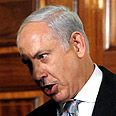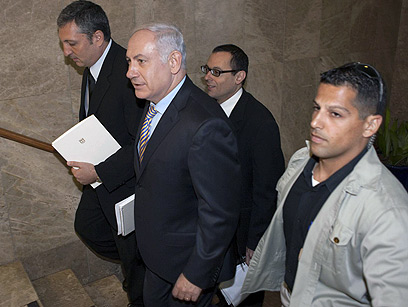
PM feels Arab world mature for peace
Netanyahu tells his ministers he is ready for 'historic compromise with our neighbors,' says 'creative solutions needed,' but clarifies that problem of settlement construction freeze 'a big obstacle.' Minister Steinitz: Building will resume
Prime Minister Benjamin Netanyahu said Sunday morning that "there is a feeling of maturity in the Arab world to reach peace." Netanyahu added that while some important countries had yet to stand by the peace process, he was under the impression that they were ready to reach peace despite the attacks.
But speaking at a Likud ministers' meeting earlier, the prime minister stressed that problem of the settlement construction freeze in the direct negotiations with the Palestinians "remains unchanged."
"There may be some important countries which have yet to stand up for a move of peace, but my impression from their willingness to reach peace despite the attacks reflects a feeling of maturity in the Arab world," the prime minister said during the weekly cabinet meeting.
"It's time to move forward towards peace with the Palestinians and extend it to a wider circle. This feeling stems from my understanding of the meaning of the other alternatives, as well as the recognition (of Arab countries) that an agreement with Israel is required."
Addressing his private meeting with Palestinian Authority President Mahmoud Abbas, Netanyahu said, "I hope our conversation and other talks later on will develop a direct, reliable and necessary relationship for an agreement. What we need right now is not multiple teams, but decisions made by leaders."
He said that Israel should learn from past peace talks. "In order to succeed this time, we must draw lessons from 17 years of negotiations, and think in a creative way and outside the box in order to reach practical solutions. I believe this is possible, and I'm willing to reach a historic compromise with our neighbors, as long as our interests – led by security – are maintained."

Prime minister arrives at cabinet meeting (Photo: AFP)
Netanyahu clarified earlier that the problem of the settlement construction freeze, which is scheduled to end on September 26, remained unchanged. "There are many obstacles in the negotiations, and continuing the freeze is a big obstacle," the prime minister said.
Vice Premier Silvan Shalom demanded that Netanyahu hold a cabinet or government meeting on the freeze issue, in light of his scheduled meeting with Abbas on September 14 in Sharm el-Sheikh.
The prime minister responded that a meeting would be held once decisions had to be made. Shalom replied that such a meeting was required as soon as possible and that "we have never seen such a thing."
Yishai: Palestinians don't want major process
The settlement freeze issue was raised again during the cabinet meeting. Finance Minister Yuval Steinitz clarified that the construction would be resumed at the end of the moratorium.
"The freeze was a one-sided gesture, and there are no negotiations on this issue," he said. "What we are saying is simple: There is no freeze, there are talks, and there will be no other decision."
Steinitz added that if the Palestinians wished to create a crisis around the issue, it was their right. "It will testify to their unwillingness to reach an agreement. Today we are not sure whether there is a secure partner. The end of September will be a test for the Palestinians."
Interior Minister Eli Yishai said that the construction freeze was "a strange demand." He added that he felt the Palestinians were not interested in a major process.
"Netanyahu made great moves, sincerely and with clean hands, but here too they are refusing and engaging in libel. What's the problem building inside settlement blocs? They want to undermine the existence of these communities. Had they asked not to build new communities, it would have been understandable, but demanding that there won't be construction in places where there is no consensus? There must be some intention behind it."
Only four ministers managed to address the settlement issue before being stopped by the prime minister.
Minister Michael Eitan, who said that it was important to maintain the peace process and that "September 26 is approaching and must not destroy the talks," was interrupted by Netanyahu, who said that "what you are saying is very sensitive."
Since the Israeli and Palestinian delegations' return to the Middle East, after the festive launching of the direct talks in Washington, there have been contradicting reports on the atmosphere of the negotiations.
Sources close to Netanyahu and Abbas reported of a warm and friendly meeting, President Shimon Peres spoke of "a very promising start," while the Palestinians said the atmosphere had changed completely.
But chief Palestinian negotiator Saeb Erekat sounded skeptic on Saturday night, accusing Netanyahu of playing for time. He said the Palestinians had rejected the prime minister's suggestions.
The Palestinians continue to demand a settlement construction freeze as a condition for continuing the direct talks, clarifying once again that they would quit the talks should the building resume on September 26, when the nine-month moratorium is scheduled to end.
Ronen Medzini contributed to this report
- Follow Ynetnews on Facebook










